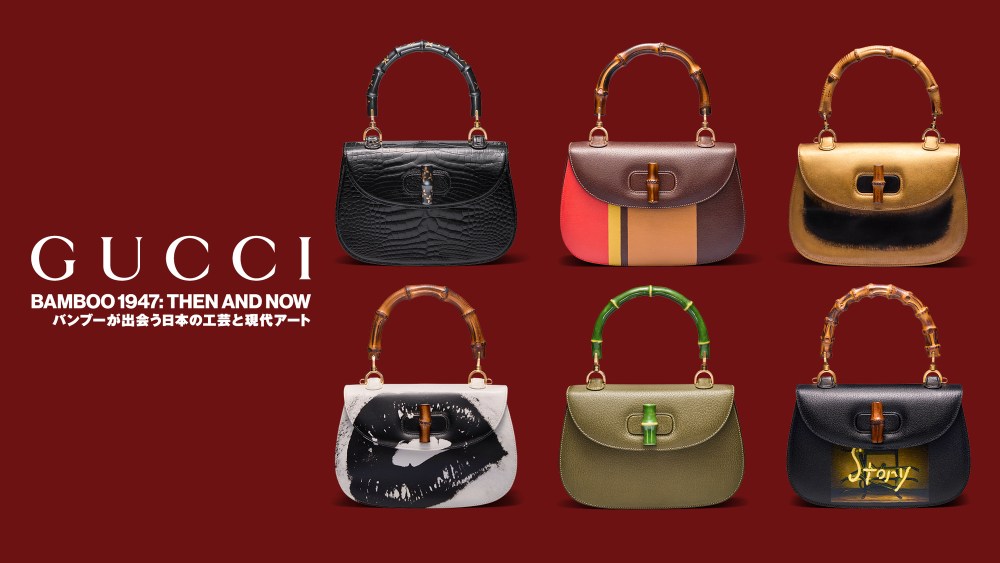MILAN — The opening of Gucci’s first boutique in Japan coincided with the 1964 Tokyo Olympics. Fast-forward 60 years and as the 2024 edition of the international multisports event will be taking place in Paris, Gucci on Aug. 2 will unveil an exhibition to mark the brand’s six decades in Japan, among other initiatives.
A Gucci Bamboo 1947 design in Sabato De Sarno‘s Rosso Ancora.
Called “Bamboo 1947: Then and Now Celebrating 60 Years of Gucci in Japan,” the exhibition will be dedicated to the brand’s Bamboo 1947 bag, and display 60 vintage models of the accessory that have been revisited by traditional Japanese artisans and artists.
The bags, mainly from the 1980s and 1990s, have been revitalized by goldsmith Morihito Katsura, a Living National Treasure certified as Preservers of Important Intangible Cultural Properties by Japan’s Minister of Education, Culture, Sports, Science and Technology; goldsmith Naoko Ai; ceramist Nakazato Hirotsune; lacquerer Ai Tokeshi; photographer Daido Moriyama; painter Nami Yokoyama, and painter Yui Yaegashi, each of whom have added their distinctive touch.
The exhibition will take place at the Gucci Ginza Gallery at the brand’s flagship in the city until Sept. 23. After the exhibition, each bag will be available for purchase as an art piece.
At the end of 2023, there were 72 directly operated Gucci stores in Japan. The first store selling Gucci products in Japan, operated by Sun Motoyama, opened in Ginza in 1964 and the brand’s first boutique was unveiled in Tokyo in 1972. It was Gucci’s first store to open in Asia.
Gucci Osteria, conceived and curated by star chef Massimo Bottura, on the fourth level of the Gucci Namiki building in Ginza, received a Michelin star in 2022, one year after its opening.
The Bamboo bag was launched in 1947 and is distinguished by the curved bamboo handle.
An image from 1963 from ArchivioFotoLocchi.
In Italy’s post-World War II era, in which traditional raw materials were difficult to source, the fashion house’s founder Guccio Gucci decided to use the lightweight and durable bamboo as an alternative for the purse’s handle, supported by Florentine artisans in developing the design.
The design ushered in an expansion of the brand’s artisanal expertise due to the highly technical process behind crafting the curved stalk. The bamboo piece is softened and worked over an open flame by hand to take a semicircular form and, once shaped, is coated in multiple layers of lacquer and baked to achieve a shiny golden-brown finish. In light of the handmade process, every bamboo handle result is different from the others.
The Gucci Bamboo 1947 bag and its archival predecessors were among the key pieces that were showcased at the recent “Gucci Cosmos” exhibition retracing the company’s 103-year history.
Following its debut, the Gucci Bamboo 1947 bag gained popularity among Hollywood stars and the international jet set.
The style got an added dose of fresh attention in February when Miley Cyrus brought her Gucci bamboo bag onstage, pulling her acceptance speech out of it during the 66th Grammy Awards.
Today, Gucci’s bamboo-handle bag is being marketed as a premium offering under creative director Sabato De Sarno. In the U.S., the bag is available by appointment only with prices ranging from $3,700 for a mini version, as seen on Cyrus, to $52,000 for a croc style.

Sophie Anderson, a UK-based writer, is your guide to the latest trends, viral sensations, and internet phenomena. With a finger on the pulse of digital culture, she explores what’s trending across social media and pop culture, keeping readers in the know about the latest online sensations.








